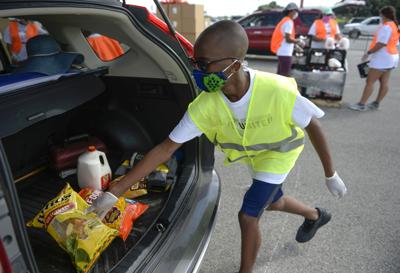More than half of Louisiana households are operating either below federal poverty standards or in the realm of “working poor” families as defined by ALICE — a United Way measure applied to people who are “Asset Limited, Income Constrained and Employed.”
That’s 51 percent of the state’s 1,735,620 households that struggle to meet their bills, the report, released Thursday in Louisiana, said. One-third of the state’s households fall into ALICE income standards.
In releasing the data, the Louisiana Association of United Ways said it showed that a family of four in the state needs income of $69,732 to make ends meet. That’s well above wages that low-income jobs like cashier, the most common job in Louisiana, can provide.
Cashiers, for example, earn $9.10 an hour and about $18,200 a year, the report said. Other common but low-wage jobs that keep people below ALICE living standards include nursing assistants, clerks and services, the report says.
“The greatest impact of the report, what it has done, is frame the needs for half of the population,” said George Bell, president and CEO of Capital Area United Way in Baton Rouge. “We understand what that need is, how fragile that population is. We hope it changes how policymakers make decisions. It enlightens people at the core of our struggles in our region and state.”
United Way researchers said Thursday that most affected Louisiana families include senior citizens, black families and households headed by single mothers. In fact, the ALICE report data suggest that those families operating within ALICE standards have increased from 23% to 33% of Louisiana households over the past decade.
The study said that over the past decade, even as unemployment fell, the number of low-wage jobs have almost doubled, leaving the working poor unable to catch up financially. And COVID-19 and the pandemic have worsened matters, news conference speakers said.
The Acadiana region’s recent progress in stemming the summer coronavirus surge appeared stalled on Thursday, as the rolling seven-day caseload…
Patty Riddlebarger, Entergy’s vice president for corporate responsibility, said that across Entergy’s service area, almost 600,000 customers were behind on their power bill payments at the end of July. The company set a monthly record for customers receiving assistance with payments; August is expected to be worse. Entergy is the ALICE statewide sponsor in Louisiana.
Elsa Dimitriadis of United Way of Acadiana said the recent numbers, which reflect 2018 data, reaffirm why the local United Way directs most of its resources toward the working poor. The pandemic, she said, has only worsened problems for those in low-wage jobs, who’ve had to deal with additional childcare worries because of closed schools even while many of them are pressed to go to their jobs as “essential workers.”
She said basic necessities for ALICE families don’t include debt payments or savings or even such expenses as haircuts or flat tires. They don’t include luxuries like birthday parties or circumstances like unplanned illnesses.
“When we have conversations about ALICE we need to understand deeply what basic necessities mean,” she said.
Lafayette of Acadiana serves Acadia, Lafayette, St. Martin and Vermilion parishes. Some 54 percent of Acadia Parish’s household fall under ALICE income standards; 43 percent of Lafayette Parish’s 94,002 homes; St. Martin, 50 percent of the 19,556 households; and 48 percent of Vermilion’s 21,632 households.
The Lafayette Parish School Board allocated $1.5 million Tuesday toward providing short-term internet connectivity solutions for students with…
“Obviously, we are looking at the numbers,” Dimitriadis said. “We will strengthen our commitment to work collaboratively with other non-profits in the area and to reach out to funders and community leaders,” she said.
Katie Pritchett, senior vice president of impact and operations for the Capital Area United Way, said that office will use ALICE data to overlay information her office collects to pinpoint the greatest areas of need in that service area, which includes East Baton Rouge Parish, where 52% of 163,274 households fall below ALICE income standards.
Bell said ALICE reports help his staff decide how to fund programs and how to shift resources toward ever-changing needs. For example, COVID-19 forced many local people out of work and created a need for food distribution. His office has worked with area grocers to provide more fresh produce to people in need.
Pritchett said ALICE numbers in that area are up from 45% to 49% in recent years, especially since the 2016 floods affected childcare availability for low-income workers.
“We’re talking about a population that relies heavily on childcare to go to work,” she said.
Mike Williamson, president and CEO of United Way of Southeastern Louisiana, said the report shows “daunting” challenges for Louisiana, especially with the extra challenges posed by COVID-19.
“We could have seen some progress,” he said in meeting the working poor’s needs since 2018. “But the reality is some of that has been undone.”
In Orleans Parish, for example, 57 percent of the 155,104 households fall below ALICE income standards.
“Looking at prior data, one in two households are doing OK. The United Way sits at the intersection of the two; we need to help connect those able to get by to help their neighbors who are not.”
He added, “50 percent of our neighbors can’t afford the basics. Our values suggest we cannot live with that scenario.”
Sarah Berthelot, president and CEO of the Louisiana Association of United Ways, said everyone knows someone who falls into the bracket of ALICE households, “hard workers” in Louisiana who make more money than federal standards for poverty but not enough to afford the basic essentials. She said such families make “tough financial choices,” such as whether to buy food or medicine.
Oftentimes, she said, they are “one emergency away” from seeing their finances spiral out of control.








